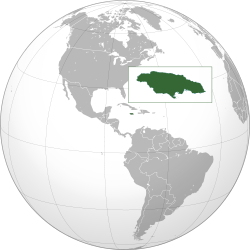Portal:Jamaica
The Jamaica Portal
Jamaica (/dʒəˈmeɪkə/ ⓘ jə-MAY-kə; Jamaican Patois: Jumieka [dʒʌˈmie̯ka]) is an island country in the Caribbean Sea and the West Indies. At 10,990 square kilometres (4,240 sq mi), it is the third largest island—after Cuba and Hispaniola—of the Greater Antilles and the Caribbean. Jamaica lies about 145 km (90 mi) south of Cuba, 191 km (119 mi) west of Hispaniola (the island containing Haiti and the Dominican Republic), and 215 km (134 mi) south-east of the Cayman Islands (a British Overseas Territory). With 2.8 million people,0 Jamaica is the third most populous Anglophone country in the Americas (after the United States and Canada), and the fourth most populous country in the Caribbean. Kingston is the country's capital and largest city. Most Jamaicans are of Sub-Saharan African ancestry, with significant European, East Asian (primarily Chinese), Indian, Lebanese, and mixed-race minorities. Because of a high rate of emigration for work since the 1960s, there is a large Jamaican diaspora, particularly in Canada, the United Kingdom, and the United States. The country has a global influence that belies its small size; it was the birthplace of the Rastafari religion, reggae music (and such associated genres as dub, ska and dancehall), and it is internationally prominent in sports, including cricket, sprinting, and athletics. Jamaica has sometimes been considered the world's least populous cultural superpower. (Full article...) Selected article - Mento is a style of Jamaican folk music that predates and has greatly influenced ska and reggae music. It is a fusion of African rhythmic elements and European elements, which reached peak popularity in the 1940s and 1950s. Mento typically features acoustic instruments, such as acoustic guitar, banjo, hand drums, and the rhumba box — a large mbira in the shape of a box that can be sat on while played. The rhumba box carries the bass part of the music. Mento is often confused with calypso, a musical form from Trinidad and Tobago. Although the two share many similarities, they are separate and distinct musical forms. During the mid-20th century, mento was conflated with calypso, and mento was frequently referred to as calypso, kalypso and mento calypso. Mento singers frequently used calypso songs and techniques. As in calypso, mento uses topical lyrics with a humorous slant, commenting on poverty and other social issues. Sexual innuendo is also common. (Full article...)Did you know (auto-generated)
Selected biography -Andrew Michael Holness, ON PC (born 22 July 1972) is a Jamaican politician, who has been the prime minister of Jamaica since 3 March 2016, following the 2016 Jamaican general election. He is leader of the Jamaica Labour Party (JLP). Holness previously served as prime minister from 23 October 2011 to 5 January 2012. He succeeded Bruce Golding as prime minister, and decided to go to the polls in the 29 December 2011 general election in an attempt to get his own mandate from the Jamaican electorate. He failed in that bid, however, losing to the People's National Party led by Portia Simpson-Miller, with the PNP gaining 42 seats to the JLP's 21. Following that defeat, Holness served as Leader of the Opposition from January 2012 to March 2016, when he once again assumed the position of prime minister. In 2020, the Labour Party won a landslide in another general election, and on 7 September Holness was sworn in for another term as prime minister. In October 2011, at the age of 39, Holness became the youngest person ever to be prime minister in Jamaica's history. In March 2016, aged 43, he became the youngest to ever be elected prime minister. He is also the first prime minister to have been born after Jamaica gained independence in 1962. (Full article...)General images -The following are images from various Jamaica-related articles on Wikipedia.
This is a Good article, an article that meets a core set of high editorial standards.
Brian Williamson (4 September 1945 – 9 June 2004) was a Jamaican gay rights activist who co-founded the Jamaica Forum for Lesbians, All-Sexuals and Gays (J-FLAG). He was known for being one of the earliest openly gay men in Jamaican society and one of its best known gay rights activists. Born to an upper-middle-class family in Saint Ann Parish, Williamson initially considered a life in the Roman Catholic clergy before deciding to devote himself to the cause of gay rights in Jamaica. In the 1990s, he purchased an apartment building in the New Kingston area of Kingston, in which he established a gay nightclub, which remained open for two years despite opposition from police. In 1998, he co-founded J-FLAG with other lesbian, gay, bisexual, and transgender (LGBT) rights activists, soon becoming the public face of the organisation. As J-FLAG's representative, he argued in favour of LGBT rights during appearances on Jamaican television and radio programs. This attracted great hostility within Jamaica – a country with particularly high rates of anti-gay prejudice – with J-FLAG members receiving death threats and Williamson surviving a knife attack. For a time he left Jamaica, living in Canada and England for several years, before returning to Kingston in 2002. (Full article...)Selected picture -Selected cuisines, dishes and foods -
Stew peas is a Jamaican stew prepared using coconut milk, beans and salted meat. It is a common dish in Jamaica. (Full article...)
More did you know
Selected listsTopicsCategoriesRelated portals
WikiProjectsGeographical:
History and Society:
Tasks
Associated WikimediaThe following Wikimedia Foundation sister projects provide more on this subject:
More portals | ||||||||||





















































